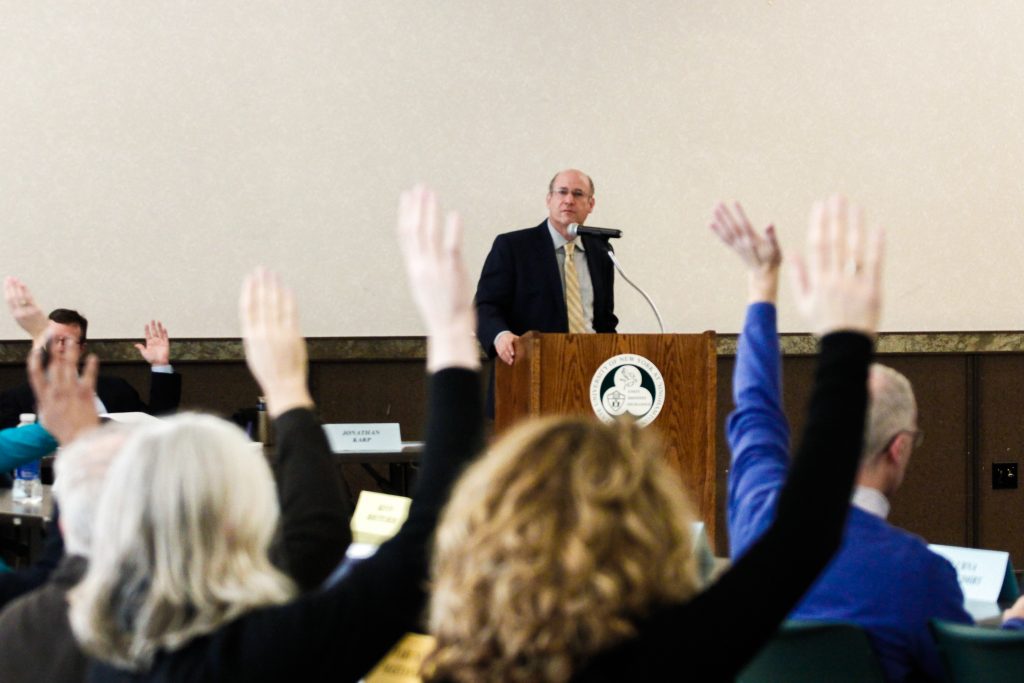Almost a month after Binghamton University’s administration announced the school was facing financial issues, faculty members discussed the University’s current budgetary situation at a Faculty Senate meeting on Tuesday.
Faculty members gathered in Old Union Hall, where they discussed Binghamton University’s recent fiscal challenges and budget cuts, among other policy changes.
The meeting consisted of an introduction and agenda report by Jonathan Karp, chair of the Faculty Senate and an associate professor of history and Judaic studies, followed by series of Q&A periods. Topics varied, but one of the meeting’s main discussions revolved around the sudden changes the University’s budget is facing because of a contract that was negotiated between the State University of New York (SUNY) and United University Professions (UUP), a higher education union for faculty, professional staff, contingent employees and retirees of the SUNY system.
The new contract requires that faculty and staff receive a 2 percent increase in pay, which will be applied retroactively for the 2016-17 and 2017-18 academic years and will last until July 1, 2022. However, New York state has declined to cover the pay increase, meaning that BU, along with other SUNY schools, will have to absorb the costs. For the University, the increases will cost roughly $12 million for the 2018-19 fiscal year, with an ongoing cost of more than $4 million in the coming years.
“I think that the Faculty Senate committee is concerned that the budget freeze is being considered an avenue for escape from this budget crisis,” Karp said. “It seems to us that it lacks a sense of a strategic possibility of investing where there is potential for increasing revenue.”
Olivia Holmes, a professor of English and medieval studies, said both faculty and staff are in need of reassurance.
“There are rumors and fears circulating among newer faculty members that the administration will try to save money by retrenching and not supporting their renewal or tenure and promotion,” Holmes said. “These fears should be put to rest by showing junior faculty members that they are valued.”
In response to faculty’s concerns that departments or programs may be cut or limited, Donald Nieman, BU’s provost and executive vice president for academic affairs, said the University is aiming to cut as little as possible from its current budget.
“First of all, these are not ‘cuts,’ rather, it is a hold on hiring,” Nieman said. “We wanted to start with a leveled playing field, and then later look at things that will help us loosen this up in a way that will generate additional revenue.”
According to Nieman, the University’s budget has grown substantially over the last six years, and any holds on the current budget will be small in comparison to the budget’s recent growth. The hold on hiring is expected to motivate BU’s administration to be more aggressive in their efforts to increase graduate enrollment.
“Increasing enrollment is one of the principal opportunities to bring revenue to the institution,” Nieman said. “I don’t see us limiting programs. I think that we have the mix of programs that we need to serve our students, so that’s not something we’re going to take away.”
The University has introduced an application for exception to the hiring freeze, which departments can fill out for a chance at getting an exemption. However, the University’s fiscal challenges have already had an impact on campus. The graphic design department recently announced its intentions to temporarily halt its minor program after classes began filling too quickly and the department was unable to meet demand with its current faculty. BU also opted to decrease the budget for University libraries this year, slashing it by roughly 4 percent, or $450,000.
Nevertheless, Nieman said the challenges are manageable. According to Nieman, the University’s administration has projected what the budget consequences will be next fall if the enrollment revenue remains flat — the worst case scenario — and based off those projections, each school within the University has been assigned a budget cut number intended to help them plan ahead.
“I wouldn’t term this a ‘crisis’ — I think it’s more like a shock to the system,” Nieman said.
Additionally, Nieman noted that the SUNY Board of Trustees will likely approve a tuition increase of $200 per year to create more revenue to help the University cover the salary raises.
Natalija Mijatovic, a professor and chair of the art and design department, discussed New York state’s involvement in the budget crisis. According to Mijatovic, the state had made negotiations, coming to an agreement with UUP, but didn’t follow through, leaving the University to scramble for the funding necessary to cover the terms of the contract.
“I am surprised by the apathy on behalf of the general Binghamton [University] community facing this problem,” Mijatovic said. “This is not going to solve itself. I think the problem is with the state, and if the state really appreciates public education as it claims, we need to make sure people know what’s going on here.”
Holmes agreed that the public should be less indifferent to New York state’s refusal to cover the raises, but said she was also concerned that the financial challenges could bring unjustified negative attention to faculty members.
“I am personally afraid that if there were more awareness of what’s going on among the general public, it could be spun to make it seem that the union and the professors themselves are bringing down the system by asking for too much,” Holmes said. “But this is not the case.”



